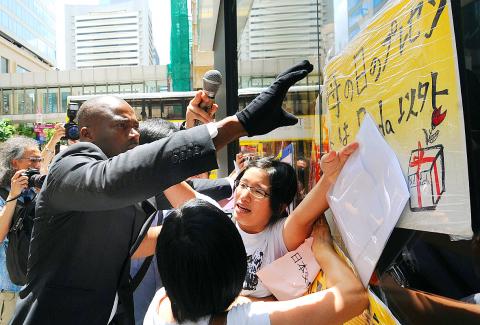Italian luxury fashion house Prada yesterday made a lackluster stock market debut in Hong Kong amid choppy global markets and waning investor interest after a string of blockbuster initial public offerings (IPO).
The family-controlled firm’s stock opened just 0.25 percent higher at HK$39.60 compared with its IPO price of HK$39.50.
After a little bit of intraday movement, it ended the session where it started at HK$39.60, while Hong Kong’s benchmark Hang Seng index rose 1.9 percent.

Photo: AFP
The Milan-based company nevertheless trumpeted its listing debut in Hong Kong — increasingly a favored gateway for foreign companies trying to tap Chinese capital.
“We are the first Italian luxury brand company to list here and this is a landmark event for the Hong Kong stock exchange,” chief executive Patrizio Bertelli said.
“I am positive the Greater China market will be an interesting market for luxury good brands. The first signs are very good,” he told reporters.
Hong Kong Stock Exchange chairman Ronald Arculli lauded the listing as a “good start” for Prada and said the exchange was doing its best to attract quality companies to list in the territory, despite volatile global markets.
The Italian group, which includes the Prada, Miu Miu, Church’s and Car Shoe brands, is the latest high-end fashion brand to tap the huge Chinese market, the world’s fastest-growing market for luxury goods.
However, weak market sentiment had pushed Prada to price its Hong Kong shares at the lower end of its price range and shrink the size of its highly anticipated IPO, raising a lower-than-expected US$2.14 billion.
Prada sold 423.2 million shares after floating 20 percent of its stock. Before the IPO, the brand had been 95 percent owned by the Prada family and executives.
Outside the stock exchange, Prada received some unwanted publicity when two dozen women’s activists staged a protest accusing the group of sexual discrimination and chanted “Only the devil wears Prada! Shame on Prada!”
The protest stemmed from the case of Rina Bovrisse, a 37-year-old former Prada manager in Japan who claimed she was unfairly fired in March last year after being told by a company executive that she was “ugly” and didn’t have “the Prada look.”

Sweeping policy changes under US Secretary of Health and Human Services Robert F. Kennedy Jr are having a chilling effect on vaccine makers as anti-vaccine rhetoric has turned into concrete changes in inoculation schedules and recommendations, investors and executives said. The administration of US President Donald Trump has in the past year upended vaccine recommendations, with the country last month ending its longstanding guidance that all children receive inoculations against flu, hepatitis A and other diseases. The unprecedented changes have led to diminished vaccine usage, hurt the investment case for some biotechs, and created a drag that would likely dent revenues and

Global semiconductor stocks advanced yesterday, as comments by Nvidia Corp chief executive officer Jensen Huang (黃仁勳) at Davos, Switzerland, helped reinforce investor enthusiasm for artificial intelligence (AI). Samsung Electronics Co gained as much as 5 percent to an all-time high, helping drive South Korea’s benchmark KOSPI above 5,000 for the first time. That came after the Philadelphia Semiconductor Index rose more than 3 percent to a fresh record on Wednesday, with a boost from Nvidia. The gains came amid broad risk-on trade after US President Donald Trump withdrew his threat of tariffs on some European nations over backing for Greenland. Huang further

CULPRITS: Factors that affected the slip included falling global crude oil prices, wait-and-see consumer attitudes due to US tariffs and a different Lunar New Year holiday schedule Taiwan’s retail sales ended a nine-year growth streak last year, slipping 0.2 percent from a year earlier as uncertainty over US tariff policies affected demand for durable goods, data released on Friday by the Ministry of Economic Affairs showed. Last year’s retail sales totaled NT$4.84 trillion (US$153.27 billion), down about NT$9.5 billion, or 0.2 percent, from 2024. Despite the decline, the figure was still the second-highest annual sales total on record. Ministry statistics department deputy head Chen Yu-fang (陳玉芳) said sales of cars, motorcycles and related products, which accounted for 17.4 percent of total retail rales last year, fell NT$68.1 billion, or

MediaTek Inc (聯發科) shares yesterday notched their best two-day rally on record, as investors flock to the Taiwanese chip designer on excitement over its tie-up with Google. The Taipei-listed stock jumped 8.59 percent, capping a two-session surge of 19 percent and closing at a fresh all-time high of NT$1,770. That extended a two-month rally on growing awareness of MediaTek’s work on Google’s tensor processing units (TPUs), which are chips used in artificial intelligence (AI) applications. It also highlights how fund managers faced with single-stock limits on their holding of market titan Taiwan Semiconductor Manufacturing Co (TSMC, 台積電) are diversifying into other AI-related firms.